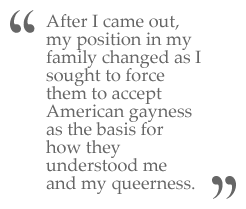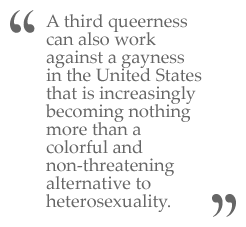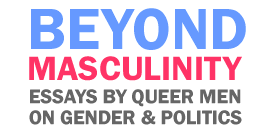 At
the core of these communities was the idea of “coming
out” - or publicly naming one’s queerness to others.
This explicitly named gayness was quite different from
the unnamed ambiguous position I held within my family.
After I came out, my position in my family changed as I
sought to force them to accept American gayness as the
basis for how they understood me and my queerness. My
efforts led to great conflicts between myself and most
of my family members. As I grew increasingly isolated
from my family, I realized that American gayness with
its emphasis on the individual wasn’t sufficient for me
or my particular situation. I began to seek a way to
construct an empowering queerness that challenged
heterosexism but that also didn’t isolate me from the
people I love so much.
At
the core of these communities was the idea of “coming
out” - or publicly naming one’s queerness to others.
This explicitly named gayness was quite different from
the unnamed ambiguous position I held within my family.
After I came out, my position in my family changed as I
sought to force them to accept American gayness as the
basis for how they understood me and my queerness. My
efforts led to great conflicts between myself and most
of my family members. As I grew increasingly isolated
from my family, I realized that American gayness with
its emphasis on the individual wasn’t sufficient for me
or my particular situation. I began to seek a way to
construct an empowering queerness that challenged
heterosexism but that also didn’t isolate me from the
people I love so much.
Constructing my queerness solely out of either Latin
American homosexuality or American gayness presents
great obstacles to the type of queerness I want to
embody. Like Juan Diego, my options are seemingly
limited – Do I choose the gendered homosexuality I grew
up with in my family or the individualistic gayness of
the country I was born in? Given the overwhelming power
of both types of homosexuality to resist challenges to
their oppressive elements, I find myself moving within
and between both systems to create the queerness I seek.
In
this essay, I reflect on my experiences living in both
systems of homosexuality and the way in which I now mix
and match elements from both to forge my own form of
libratory queerness. I explore first my early childhood
growing up ambiguously queer in my family and then
examine my emergence into American gayness as a
teenager. Finally, I trace my attempts to create an
identity that is a mixed blend of the two systems of
homosexuality that have defined me, all in the hope of
not only liberating myself but also to transform Latin
American and American homosexualities. I do not
necessarily believe my life to be special or unique – no
Virgin Mary appeared to me - but instead I see my life
as a useful source from which to extract a queer
masculinity that can support me in being the kind of
queer man I want to be. My youth, for all of its mundane
routines, was spent in the murky borders where my
family’s ideas of homosexuality rubbed up against the
gay individuality of the United States. This constant
rubbing produced a space from which my own queerness was
born. I call that space a mestiza/o gender.
At
the core of both my journey and this essay is a creative
process of reclamation. Rather than simply giving up on
both of these homosexualities, I seek to work within
them by taking elements from both and combining them
together in a new way that can challenge the oppressive
components within each. Queer theorist José Esteban
Muñoz, in studying the oppositional and creative use of
mainstream heterosexual and queer cultures by queer of
color performance artists, has articulated a process
similar to the one I wish to engage in. Muñoz calls this
process disidentification. He describes this as,
… the third mode of
dealing with dominant ideology, one that neither opts to
assimilate within such a structure nor strictly opposes
it; rather, disidentification is a strategy that works
on and against dominant ideology … this 'working on and
against' is a strategy that tries to transform a
cultural logic from within, always laboring to enact
permanent structural change while at the same time
valuing the importance of local or everyday struggles of
resistance. [ 4 ]
Moving beyond the binary idea that in the face of
oppressive forces one can either purely resist or
assimilate, Muñoz instead sees disidentification as a
means to creatively engage with structures of injustice.
Disidentification allows marginalized individuals to
take the tools of oppression used against them and use
them in new ways that alter their meaning so as to
challenge the very oppression from which they are drawn.
Muñoz values disidentification because it presents a
means to escape the binary of assimilation and
counteridentification which both serve to reinforce the
dominance of oppressive systems. It is what Muñoz calls
‘working on and against’ that makes disidentification a
powerful means of altering the harmful elements of both
Latin American homosexuality and American gayness.
 I
utilize disidentification to blend the two forms of
homosexuality so as to construct a third path of
queerness that can escape the limitations of both.
Through disidentification, I can work against the
totalizing power of Latin American homosexuality to trap
queers in the gender system of man/woman. A third
queerness can also work against a gayness in the United
States that is increasingly becoming nothing more than a
colorful and non-threatening alternative to
heterosexuality. As gayness in the United States becomes
more mainstream, it is not only leaving unchallenged
dominant ideals of consumerism as citizenship, but in
fact it is using those same ideals as the definition of
social justice for queers. Since both forms of
homosexuality are limiting and perpetuate violent forms
of oppression, I must create a queerness through my
daily practices that draws from the most transformative
in both while challenging the most repressive in each.
I
utilize disidentification to blend the two forms of
homosexuality so as to construct a third path of
queerness that can escape the limitations of both.
Through disidentification, I can work against the
totalizing power of Latin American homosexuality to trap
queers in the gender system of man/woman. A third
queerness can also work against a gayness in the United
States that is increasingly becoming nothing more than a
colorful and non-threatening alternative to
heterosexuality. As gayness in the United States becomes
more mainstream, it is not only leaving unchallenged
dominant ideals of consumerism as citizenship, but in
fact it is using those same ideals as the definition of
social justice for queers. Since both forms of
homosexuality are limiting and perpetuate violent forms
of oppression, I must create a queerness through my
daily practices that draws from the most transformative
in both while challenging the most repressive in each.
I name this queerness “mestiza/o gender”
to both reflect the combination of Latin American and
American homosexualities that I propose but also to draw
on the historical process of mestizaje. The
development of the idea of mestizaje itself is
fraught with complexities of power and struggle. The
word mestiza/o was first used by Spanish
colonialists as one category of nearly 100 in their
complex racial hierarchy system that placed them at the
top and enslaved Africans and the indigenous at the
bottom. Mestiza/o referred to people who were the
children of a Spaniard and an Indigenous person.
In the
beginning of the 20th century, mestiza/o
was adopted by Mexican intellectuals to define the
mixed racial heritage of Mexico as the basis for a
cosmic mission of global unity that could thus only be
achieved by the Mexican state/people. This vision of an
imperialist mestizaje was used by Mexican elites
to erase the contemporary repression of the indigenous
and Afro-Mexican peoples by the Mexican state. [ 5 ]
From there, the idea of mestizaje was taken up by
the Chicana/o Power Movement of the 1960’s and 1970’s as
a means to describe the racial and cultural mixtures
that define the experiences of Mexican Americans in the
United States. To this day, mestizaje remains a
pillar of Chicana/Latina identity and politics. Given
the varied and contradictory threads that have gone into
the creation of my self, I use the word mestiza/o
fully aware of its historical development to capture the
complicated queer mixture - sometimes smooth, at other
times rough - that I propose to create... (continue reading)




5 COMMENTS ON THIS ESSAY:
Great essay!Very proud of you for writing this.
GREAT ESSAY!!! good work.
amazing!
i'm so very proud of you, Daniel.
hello daniel
i was wondering, is there maybe a spanish version of your article?
(i would like a spanish/french friend of mine who's lived in latin america for some years to read your piece, and english is difficult for her)
daniel mang
toulouse/france